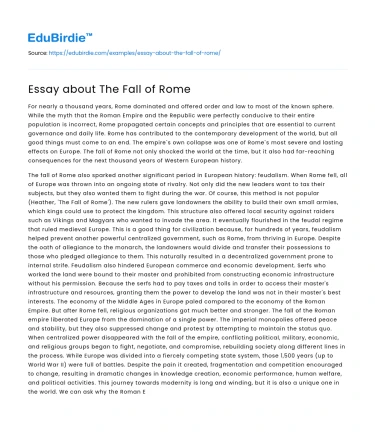For nearly a thousand years, Rome dominated and offered order and law to most of the known sphere. While the myth that the Roman Empire and the Republic were perfectly conducive to their entire population is incorrect, Rome propagated certain concepts and principles that are essential to current governance and daily life. Rome has contributed to the contemporary development of the world, but all good things must come to an end. The empire`s own collapse was one of Rome`s most severe and lasting effects on Europe. The fall of Rome not only shocked the world at the time, but it also had far-reaching consequences for the next thousand years of Western European history.
The fall of Rome also sparked another significant period in European history: feudalism. When Rome fell, all of Europe was thrown into an ongoing state of rivalry. Not only did the new leaders want to tax their subjects, but they also wanted them to fight during the war. Of course, this method is not popular (Heather, 'The Fall of Rome'). The new rulers gave landowners the ability to build their own small armies, which kings could use to protect the kingdom. This structure also offered local security against raiders such as Vikings and Magyars who wanted to invade the area. It eventually flourished in the feudal regime that ruled medieval Europe. This is a good thing for civilization because, for hundreds of years, feudalism helped prevent another powerful centralized government, such as Rome, from thriving in Europe. Despite the oath of allegiance to the monarch, the landowners would divide and transfer their possessions to those who pledged allegiance to them. This naturally resulted in a decentralized government prone to internal strife. Feudalism also hindered European commerce and economic development. Serfs who worked the land were bound to their master and prohibited from constructing economic infrastructure without his permission. Because the serfs had to pay taxes and tolls in order to access their master's infrastructure and resources, granting them the power to develop the land was not in their master's best interests. The economy of the Middle Ages in Europe paled compared to the economy of the Roman Empire. But after Rome fell, religious organizations got much better and stronger. The fall of the Roman empire liberated Europe from the domination of a single power. The imperial monopolies offered peace and stability, but they also suppressed change and protest by attempting to maintain the status quo. When centralized power disappeared with the fall of the empire, conflicting political, military, economic, and religious groups began to fight, negotiate, and compromise, rebuilding society along different lines in the process. While Europe was divided into a fiercely competing state system, those 1,500 years (up to World War II) were full of battles. Despite the pain it created, fragmentation and competition encouraged to change, resulting in dramatic changes in knowledge creation, economic performance, human welfare, and political activities. This journey towards modernity is long and winding, but it is also a unique one in the world. We can ask why the Roman Empire existed if Europe was not fertile territory for empire building. The Romans were successful because they took advantage of a set of events that were difficult, if not impossible, to reproduce thereafter. Their commanders were smart enough to use civic responsibilities, financial incentives, and alliances to get a lot of regular farmers to join the army for cheap. Rome also benefited from the low level of state creation in the western Mediterranean and the fact that the larger kingdoms in the far east were at war with others. As a result, they conquered and consumed other communities one by one. In the centuries that followed, though, Europe was full of warring powers, so none of them could take over everything else.
Save your time!
We can take care of your essay
- Proper editing and formatting
- Free revision, title page, and bibliography
- Flexible prices and money-back guarantee
In general, we focus on the heritage of Roman civilization that is still visible today, such as the Roman languages, the Roman writing system, and many names, as well as the Julian calendar, Roman law, architectural styles, and, most recently but at least, a lot. All of these factors continue to influence our lives. But, when it comes to explaining why the world has dramatically changed over the past few centuries, the single most important contribution of the Roman Empire seems to be that it has disappeared forever, irreplaceable. This break is essential in creating the appropriate circumstances for revolutionary change to take place over time. The most important heritage we often do not see. The fall of Rome was inevitable for the world to be what it is today, but it was still a tragedy in many respects.






 Stuck on your essay?
Stuck on your essay?

